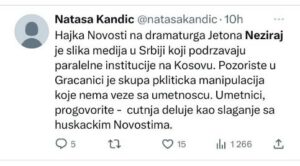The Serbian government and pro-government media in Serbia have undertaken a coordinated lynching campaign against Jeton Neziraj – a renowned playwright from Kosovo, - in the wake of the publication of the article “Theatre as machinery of political propaganda”, published in Sbunker in two parts as a critique on the controversial musical LIFT: Sllobodan Shou, staged in Gracanica, on the 6th of March 2018. In this article Neziraj points out the ideological intentions of the Serbian Government in using the parallel theatre as a tool for its hegemonic interest, particularly in its relation to Kosovo.
Furthermore, Neziraj argues that: “This theatre was established as an attempt to create continuity of the ‘Serbian institutions’ that existed in Kosovo before the war, in “their then-province”. Their goal, at least symbolically, is for these institutions (i.e., of this theatre displaced temporarily in Belgrade), to one day return and be reinstated in Kosovo”.
In a coordinated attempt to downplay the arguments laid out by Neziraj, certain pro-government and Russian media in Serbia spread disinformation by intentionally spinning and misinterpreting Neziraj’s messages and arguments. For a number of days, “Novosti” and “Sputnik” published a series of propagandistic articles featuring protagonists from various fields that attacked Neziraj ad-hominem.

Soon enough, the Ministry of Culture of Serbia joined the campaign by accusing Neziraj for having the intent to “destroy the Serbian culture in Kosovo”
“Calling such an institution [the Serbian theatre is a tool of Great Serbian hegemonic propaganda is terrible, as it is extremely dangerous for the safety of Serbs in Kosovo and Metohija,” the Ministry said in an official statement.
Apart from the Serbian Government and the media, accusations towards Neziraj were thrown also from various artists and theatre professionals from Kosovo and Serbia. The Association of Professional Theatres of Serbia accused Neziraj that through the article published in Sbunker is trying to “destroy the Serbian theatre and attack the Serbian artists”.
Predrag Radonjiq – the director of the so-called “People’s Theatre of Prishtina” – said that Neziraj’s ideas are “similar to those of the Albanian intellectual elite, whose aim is to make the life of Serbs impossible”.
Meanwhile, playwright and author of the play LIFT: Sllobodan Shou– stated in an interview in the daily Danas that she “was surprised” by this article and that she had now clearly understood “the political agenda of Jeton Neziraj” and that “there is a mobilization around the goal of shutting down the People’s Theatre in Gracanica”. She added that the play about Milosevic’s life speaks for itself and that it is based “solely on documentary data, and those published in media, and other publications…”. Ironically, playwright Bogavac reconfirms Neziraj’s criticisms about the tendencies of the authors to relativize and downplay war crimes committed by Milosevic’s regime in Kosovo and elsewhere in the 1990’s.
There were others who voiced their support for Neziraj, and most notably the writer and critic Sasa Ilic, who said in an article for Pescanik that “theatre in Serbia is dead”. “In this case, what is at stake is a concerted attack on playwright Jeton Neziraj, who is otherwise one of the preferred guests of Belgrade’s theatre in the times of peace. But when political darkness falls, things change fundamentally”.
The director of Humanitarian Law Center, Natasa Kandic has said that the Theatre in Gracanica is “a political manipulation that has nothing to do with art”, and urged artists to speak up in support of Neziraj and against the warmongering media like “Novosti”.

After the lynching campaign that lasted a week in a row, Neziraj responded. He said, for Sbunker that the whole orchestrated hysteria of reaction is driven by a false belief that the article’s aim was to pave the way for shutting down the “People’s Theatre of Pristina”, “temporarily displaced in Belgrade”, as they say in Serbia.
Neziraj believes these attacks against him are ad-hominem and demonizing.
“Almost in all of these articles the main question was “why write this exactly now”, and even when this wasn’t the question, it was implied, namely that my “article was part of a political conspiracy against the Serbs in Kosovo”. In these articles I am portrayed as the “enemy from Prishtina”, a man with superpowers, who possesses that kind of decision making needed to shut down that theatre.”
Furthermore, Neziraj said that he was dumbfounded by the extraordinary speed in which he was transformed to “Prishtina”, or to “Albanians”. “Slowly but surely, I was stripped of all the personal and artistic attributes and was given representative national attributes, meaning governmental ones. And, in fact, oftentimes, by exaggerating my importance as a playwright, their aim was to exaggerate my importance and power for taking such important decisions”, Neziraj said.
Speaking about the meaning of this coordinated reaction of Theatre Association of Serbia, artists, informal groups and the Government of Serbia, Neziraj says that there was a national alarm raised in Serbia, like seldom before.
“The liberal intellectual” or “the most liberal Albanian in Kosovo”, as they called me univocally, suddenly became “the enemy of the Serbian theatre”. While in the past, such articles served as preparation for the uprisings of march 2004, now I am supposed to be the one paving the way for “the eradication of the Serbian culture” in Kosovo”, says Neziraj.
Neziraj claims that the hysteria in Serbia was driven by pieces taken out of context, from reinterpretations and spinnings of what I said in the article. And this speaks of the contaminated media landscape in Serbia, and also the contaminated cultural milieu, that whenever “the national cause” is concerned, reacts, mourns, and attacks in gangs, almost like a wolfpack”.
Neziraj reiterated that the establishment of a theatre is always an emancipatory act, but the theatre in Gracanica was not established by the Government of Serbia on these artistic and social principles, as an artistic enterprise for social and cultural emancipation. On the contrary, it was established with political-hegemonic goals, because hegemonic approach was and still remains the official Serbian policy towards Kosovo. However, for many in Serbia, including artists and others, this is not properly understood.
“They take my critique out of the social and political context of our countries. Therefore, my ideas and what I say is to them are very strange and confusing. I am not against theatre… Never have been… Never can I be. I am against that sort of theatre that is used as a proxy ideological tool. I am against that sort of theatre that, instead of healing wounds, opens fresh ones, and causes more pain”, says Neziraj.
LIFT: Sllobodan Shou portrays the life of Slobodan Milosevic and his relationship with his family during the NATO bombing of Yugoslavia in 1999. Plays like that one in Gracanica, according to Neziraj, do not serve the public, but are created instead to reproduce trauma, offend victims and the memory of innocent people who have suffered by Milosevic’s regime.
*This article is published as part of the Western Balkans Regional Initiative against disinformation. “Western Balkans Anti-Disinformation Hub: exposing malign influences through watchdog journalism.”





























































